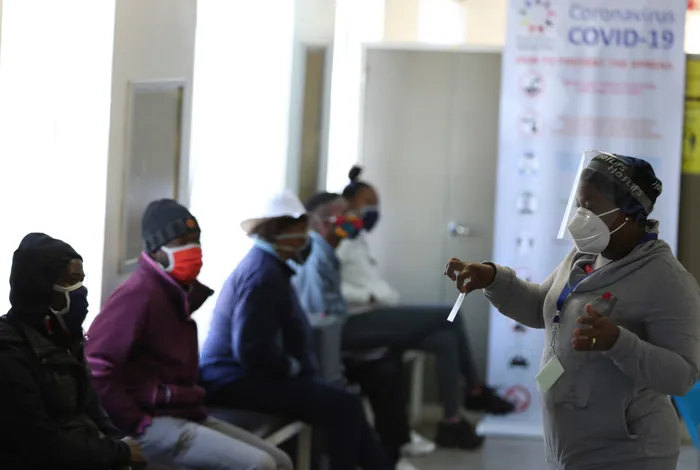Gauteng sticks to its original plan for the fourth wave

People sit in a health clinic. The Gauteng Health Department is counting on the lessons learnt during the first three waves of Covid-19 infections. Picture: Siphiwe Sibeko/AP
Gauteng hospitals have been found to lack the capacity to cope with the Covid-19 pandemic during the past waves of infections.
But the provincial Department of Health is adamant that it is going to use the same “risk-adjusted strategy” in responding to the anticipated fourth wave.

Some hospitals in the province had to hastily build makeshift tents in order to increase bed capacity due to the shortage of beds during the third wave.
At Helen Joseph Hospital in Johannesburg, some Covid-19 patients sat in the casualty unit for two days with oxygen tanks, waiting for a bed to be admitted.
At Chris Hani Baragwanath Academic Hospital the deployment of medical staff from the SA National Defence Force (SANDF) also showed the lack of preparedness.
Last year the former health MEC Bandile Masuku revealed in the legislature that during the peak of the second wave, the province had a shortage of 6,878 critical care beds and 1,788 ICU nurses.
However, the spokesperson for the Health MEC, Kwara Kekana, said for the fourth wave they would use the same resources and lessons learnt from the previous waves, in line with the risk-adjusted strategy.
“All hospitals will be utilised for the fourth wave as it was with all the previous waves of the Covid-19 pandemic.
“We have 4,407 functional beds ready to be deployed for the fourth wave as per the experience of the third wave. It is a clinical decision and risk-adjusted strategy,” said Kekana.
Asked about allegations that hospital CEOs were taking leave during what was expected to be the peak of the pandemic when they would be needed the most, Kekana said: “Leave management is the prerogative of the GDOH and it is managed within HR principles and prescripts.”
Kekana also played down the fact that the Nasrec field hospital was decommissioned without receiving a single patient after it was built at a cost of R248 million.
“The Nasrec Covid-19 facility was used and played its role significantly until it was decommissioned.
“The Anglo Ashanti facility is functional and forms part of our contingency for the fourth wave as it was also used for the third wave, and will continue to be utilised,” said Kekana about the R500m health facility.
However, DA health spokesperson Jack Bloom said he was concerned about staff shortage and the wasteful expenditure of building facilities that end up not being utilised.
“I am concerned that annual leave in December will mean a shortage of staff to cope with a possible upsurge of the virus.
“Gauteng currently has the lowest percentage in all the provinces of adults who are fully vaccinated – only 28% compared to 32% for the country as a whole,” said Bloom.
“The Anglo Ashanti Hospital is a total waste of R500 million that was irregularly spent on it, and the SIU is investigating corruption in this matter.
“I think that fewer than 100 Covid-19 patients have been treated at this hospital, but this was low-level care and they could have been treated elsewhere.
“It is a white elephant that continues to cost money that should be redirected to other hospitals that are better located and need more staff and equipment.
“Most health experts are predicting the fourth wave late next month or early next year due to the lack of vaccine uptake,” said Bloom.
Young Nurses Indaba Trade Union (YNITU) general secretary Rich Sicina said the country was never prepared in the first place and a lot of lives were lost unnecessarily during the previous waves.
Sicina said: “We have always maintained a posture that South Africa will never be ready for this pandemic, to curb it in its totality and to prevent unnecessary death of people.
“South Africa's health system is disorganised and badly run… let alone oxygen cylinders; there is a gross shortage of these (oxygen cylinders). Many health facilities especially in rural areas rely on oxygen cylinders.”